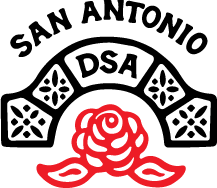Palestine and Politics As a Way of Life
by Alex Birnel
On February 25, 2024, Aaron Bushnell—a local unaffiliated comrade who was deeply involved in local mutual aid efforts, and a friend to many—self-immolated in front of the Israeli Embassy in Washington D.C. in protest of the genocide in Gaza and the complicity of the US military. On March 1st, friends of Aaron organized a vigil, not only to commemorate Aaron, but to “pay homage to Palestinians taken from our world, the resistance fighters and ordinary people who continue to love humanity in the face of unspeakable brutality and genocide.”
Alex Birnel, a founding member of San Antonio DSA and a current leader in San Antonio for Justice in Palestine (SAJP), gave the following speech toward the end of the vigil.
Good evening everybody. What a beautiful commemoration to a comrade. I have a lot of thoughts going through my mind right now about what needs to be said, versus what I want to say. So I’m just going to speak honestly, and hope that what comes out makes sense. I’m going to remember to not have snarkiness about a serious thing, which is such an important lesson - and what I’m told somebody like Aaron really embodied. He wanted people to learn, he wanted people to understand, he wanted people to connect, he wanted to help.
I was lucky enough to go to Palestine last summer, in July 2023. And as I walked around the old city of Nablus, I noticed something that I took mental note of: everywhere I looked, people celebrated, cherished, and remembered their martyrs. I had a conversation with a friend that I met that night, named Ziad. As we were talking about politics – me organizing in Texas, him organizing in Palestine, comparing notes – we talked about differences. And the difference is, as far as I can tell, that tragically, unfairly, wrongly, politics in Palestine is a way of life. Because people are killed every day by Israel. Space is managed. It is an apartheid system. People’s movements are controlled. There is no such thing as a schedule in Palestine. You might have an important day, a wedding, or a birthday – but it all depends on the mood of a soldier or on the status of a checkpoint. Everybody has a family member that they've lost, and entire communities, entire cities, treat all of this as definitional to their existence.
Then I talked about here, here in San Antonio, here in Texas, here in the United States; so-called San Antonio, so-called Texas, the so-called the United States. And the main thing that I felt was different is that politics here is a hobby: to the extent that you can say, I’m going to go to my protest, and you’re going to go to your concert, and then we’ll meet up afterward for a drink. Politics is just something you do recreationally rather than part of the fabric of what you do with your time on Earth.
And from what I can tell, Aaron was the kind of person who used his time to not treat politics as a hobby, but to treat it as a life philosophy, as definitional to life. And I’m most heartbroken that this city has lost somebody who helps feed the homeless. Our unhoused neighbors. Because our government surely isn’t doing that.
So I want to ask everybody in the audience: what can you do to make resisting the systems that harm us, in this city, around this country and around the world, less of something that you do with a little bit of your time, and more of who you are? It is unfair that Palestinian existence is so synonymous with politics. I wish it didn’t have to be true that people have to focus so much of their time on life and death, on resistance. People deserve to enjoy, deserve to laugh, deserve to appreciate the things we will never understand about being alive.
A lot of us here get to do that with our existence. And I think that’s what makes politics more of a hobby than a way of life. And the responsibilities get inverted. Palestinians are of the oppressed people of the world. There are a lot of privileges that come with living in this society. Not to say that there aren’t oppressions here, there absolutely are, and Aaron was helping to bring some relief to oppressions that exist in this city.
But I think most of all, the question on my mind is: what can you do every day, as a member of this community, with the people who are here, to improve this world? So that somebody else – who you will never meet, who you will never know – doesn’t have to spend all of their waking hours, cradle to grave, in a freedom struggle. I genuinely believe that that is our responsibility. To be different people, than we often find ourselves being. Indifferent, casually engaged, uninvolved. So ask yourself, how do you resist, how can you educate yourself, how can you get involved in an organization? Can you learn about what is happening in your community, what the problems in your community are, and how you can solve them? Can you make a friend, can you bring a friend to a meeting? I think those are the best ways that we can honor somebody who has issued us a challenge. Which is that these systems need a whole lot more people to be toppled, to be defeated, to be changed – and we aren’t going to get to another world without many more of us realizing that.
Aaron has lit a fire in me, and we have lit a fire in commemoration of Aaron. I hope that we keep burning together, until the world is better. Please keep organizing. Please take care of one another. Please express love. Thank you.

